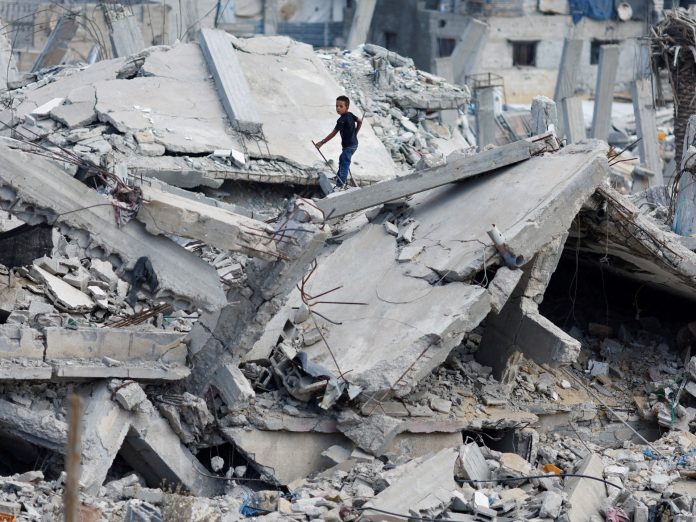My grandfather, Hamdi, was only eight years old when his family escaped from Bir al-Sabaa, a town in southern Palestine once famous for its fertile land and agricultural life. His father, Abdelraouf, was a farmer who owned nearly 1,000 dunams of land and grew wheat, selling the harvest to merchants in Gaza. Their family lived happily and comfortably.
In October 1948, a few months after European-Zionist forces declared the establishment of Israel, Israeli troops attacked Bir al-Sabaa, forcing thousands of Palestinians, including my grandfather’s family, to flee to avoid being killed.
“We left Bir al-Sabaa when the militias arrived,” my grandfather would often recount. “My father thought it would be a temporary move. We left our home, land, and animals behind, hoping to return. But that never happened.”
Hamdi’s family fled on foot and by horse-drawn cart. What they thought would be a short displacement turned into a permanent exile. Like 700,000 other Palestinians, they became survivors of what is now known as the Nakba.
His family took refuge in Gaza, where they lived in temporary shelters with extended family. Relatives helped them purchase a small piece of land in the Tuffah neighborhood of Gaza, just 70km (40 miles) from their home in Bir al-Sabaa, which the Israelis renamed Beersheba. Hamdi’s family struggled to rebuild their life.
Seventy-five years after my grandfather’s painful experience of displacement, sorrow, and survival, my family and I also became victims of the Nakba.
At 4 am on October 13, 2023, my mother’s phone rang. We were all sleeping in one room of our home in the Remal neighborhood of Gaza City, seeking solace from the constant noise of drones and warplanes overhead. The phone abruptly woke us up.
It was a recorded message from the Israeli military warning us that our home was in a danger zone, instructing us to move south. Fear gripped us as we rushed outside, only to find Israeli leaflets scattered around with the same warning. We had no choice but to quickly pack some clothes and bedding and flee.
It wasn’t the first time we were forced to leave our home. Since the age of 12, I have witnessed Israeli assaults on Gaza that have repeatedly forced us to flee, living in fear and uncertainty.
I learned to recognize the sounds of bombs, F-16 jets, Apache helicopters, and drones at a young age. I intimately understood the terror they brought.
Previous displacements were temporary, and we hoped this one would be too – just as my grandfather believed his family would one day come back.
But now, there seems to be no chance of returning. Our home was severely damaged by an Israeli tank. The upper floor was charred, and a whole wall on the lower floor was missing. Everything we owned was destroyed.
The handbag with a few clothes I grabbed on October 13 is everything I have left.
We journeyed to az-Zawayda in the central Gaza Strip to seek refuge with relatives. Along the way, we saw scores of other Palestinians carrying bags of clothes and searching for safety.
From our temporary shelter, I witnessed the anguish of exile in every crammed corner. We shared a flat with 47 other people, united by the chilling realization that nowhere was safe. We spent two months in that crowded apartment near Salah al-Din Street, but constant explosions forced us to relocate to another house in the area.
On January 5, the sound of sniper fire and gunshots grew louder. Soon, artillery and bombs thundered. We gathered our meager possessions and fled to Deir el-Balah.
We were compelled to live in an eight-person tent for three months before moving into a small, poorly insulated room on a plot of land belonging to a friend. This is where we are spending the winter. Rain seeps through nylon windows, and the cold is unbearable, leaving us sleepless most nights.
We have struggled to secure even the most basic necessities – food and water. For the past two days, we have survived on tainted water and a lone loaf of bread. Starvation has sapped our strength and hope.
I now comprehend the Nakba of 1948 in a way I never did before. It’s the narrative of my grandparents replaying in our generation, but within the confines of Gaza. And honestly, it feels even more harrowing than the Nakba of 1948. The weapons employed today are far more advanced, causing unprecedented devastation and widespread death and injury – something unimaginable to my grandparents in 1948.
The suffering isn’t just physical; it’s also psychological. Witnessing the unimaginable – constant fear, loss of loved ones, the battle for basic survival – has taken a toll on us. During sleepless nights, the deafening boom of rockets and memories of shattered bodies and ruined homes haunt us. I observe my family members and notice the changes in their faces; their vacant eyes and silent tears speak volumes. Walking the streets, I see communities recognized for their kindness and unity shattered by loss and devastation.
It’s evident that Israel’s objective is to expel Palestinians from historical Palestine by any means necessary. The dread of being evicted from Gaza is overwhelming. With homes reduced to rubble and entire neighborhoods obliterated, the prospect of our exile looms large. I never envisioned leaving my home, but after losing everything, Gaza no longer feels like a place to inhabit – only a graveyard of despair and loss.
Every Palestinian has been impacted by displacement, by the fear of losing their homeland forever. The Nakba truly remains the enduring tale of Palestine.
The views expressed in this article are the author’s own and do not necessarily reflect Al Jazeera’s editorial standpoint.






